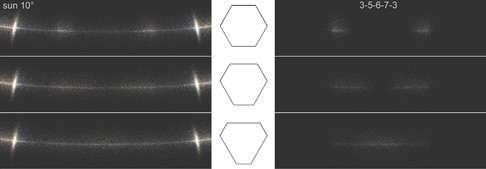Wednesday, 7 April 2010
Liljequist parhelion does not exist
Changing crystal shape causes surprising behavior with Liljequist parhelion, casting doubts on its identity as a halo form. Look at the simulations above, larger image opens by clicking.
I have simulated (software: HaloPoint2.0) the anthelic side of the plate parhelic circle with three crystal shapes. On the left are all rays, on the right only the 3-5-6-7-3 rays that I have often referred as the main contributor to the Liljequist parhelion. But the shape of light stripe created by the 3-5-6-7-3 rays depends on the crystal shape. This means that the definition of the Liljequist parhelion becomes so murky that we might as well forget about it; 3-5-6-7-3 rays are just rays that light the parhelic circle, nothing more.
The other ray that I have mentioned of being responsible for the Liljequist parhelion is the 3-5-6-7 ray. Its product does not change with crystal shape, but it is probably too weak alone to produce any visible brightening on parhelic circle. I think it was me who originally brought up the Liljequist parhelion. I apologize for the mess. I guess we should let go of Liljequist, but it has been around for a while, so that may be easier said than done.

What an interesting indicator of the dominating presence of regular hexagons! No Lilje -> continuum of different hexagonal profiles, yes Lilje -> regular hexagons dominate.
ReplyDeleteIf the halo is defined by its raypath, then all these variations must be regarded as Liljequist parhelion. The liljes' stretch towards each other as the crystal shape becomes more triangular. It is continuum of shapes, so where would one put the limit, this is Lilje and this is not?
ReplyDeleteSure, we have similar problems with 22 and 46 column arcs. As crystal tilts increase, they become 22 and 46 halos. It is a matter of taste how defined the brightening above the sun at 22 distance must be to regard it as 22 column arc or 22 halo.
But in Lilje's case it is not about becoming another halo, it is about changing shape. I am thinking of dropping the Lilje off the book from the main halo list.
I too was wondering about this after Marko's post - for instance the Kern arc benefits from triangular crystals but, indeed, it does not change its shape.
ReplyDeleteI think from the point of halo theory dropping Liljes might make sense whereas from the observer's perspective it would be a loss.
Emotionally I'd like to hang on to this naming convention even if Liljes' status as an independent halo form is questioned.
I think I was wrong to call this a shape change. There are definite atzimuthal bounds towards the sun for the 3-5-6-7-3 effect, but towards the anthelion there are no bounds, it is just a change in intensity distribution according to crystal shape and same happens with Kern.
ReplyDeleteIf we forget about the theory and would name halos only by their looks, then sure, elongated brightenings occurring rarely on parhelic circle opposite to the sun certainly could be regarded as independed haloforms.
Have to make some more simulations.
That behaviour may be annoying, but it alone does not mean that Liljequist parhelia is not a genuine halo form.
ReplyDeleteBut Marko is right in the main issue here. Liljequist parhelion is only a part of parhelic circle. Especially ray path 3-5-6-7-3 is in matter a fact like ray path 3. So we can argue that Lilje is only an effect on parhelic circle very much like blue spot is.
So, if the other Lilje ray path 3-5-6-7 is too weak to produce any visible brightening, we can say that Liljequist parhelia is not a truly genuine halo form.
Nevertheless, I think we can still use name Liljequist parhelia with those brightenings. And we should not forget that Liljequist subparhelia can be really clear and bright.
I think Walt got all this right already in his Atmospheric halos book in 1994.
Right, Liljequist is here and stays.
ReplyDeleteJust like dropping Planet Pluto from the list I still think it should stay just like the liljequist parhelia should stay
ReplyDeletefascinating
ReplyDelete